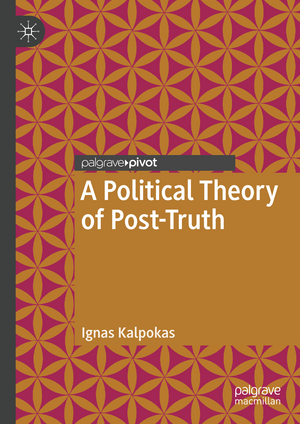A Political Theory of Post-Truth
Autor Ignas Kalpokasen Limba Engleză Hardback – 28 aug 2018
Preț: 467.93 lei
Preț vechi: 550.50 lei
-15% Nou
Puncte Express: 702
Preț estimativ în valută:
89.54€ • 93.74$ • 74.09£
89.54€ • 93.74$ • 74.09£
Carte tipărită la comandă
Livrare economică 05-19 aprilie
Preluare comenzi: 021 569.72.76
Specificații
ISBN-13: 9783319977126
ISBN-10: 3319977121
Pagini: 125
Ilustrații: X, 135 p.
Dimensiuni: 148 x 210 mm
Greutate: 0.33 kg
Ediția:1st ed. 2019
Editura: Springer International Publishing
Colecția Palgrave Pivot
Locul publicării:Cham, Switzerland
ISBN-10: 3319977121
Pagini: 125
Ilustrații: X, 135 p.
Dimensiuni: 148 x 210 mm
Greutate: 0.33 kg
Ediția:1st ed. 2019
Editura: Springer International Publishing
Colecția Palgrave Pivot
Locul publicării:Cham, Switzerland
Cuprins
1. Introduction.- 2. Post-Truth: The Condition of Our Times.- 3. Enabling Post-truth: Mediatisation and Affect.- 4. Making the Theory Political.- 5. Conclusion: For unto Us Post-Truth Is Born.
Recenzii
“In A Political Theory of Post-Truth, Ignas Kalpokas offers a nuanced and lucid description of the conditions and content of a post-truth world, drawing particularly on the work of the seventeen-century philosopher Baruch Spinoza with support from the twentieth-century post-structuralist Gilles Deleuze. Going beyond cliches and superficial diagnosis, this is a perceptive, yet alarming, vision of an ever-more embedded post-truth future … .” (Roderick Howlett, LSE Review of Books, blogs.lse.ac.uk, February, 2019)
Notă biografică
Ignas Kalpokas is Assistant Professor of International Relations and Development in the Department of Social Sciences at LCC International University, Lithuania, and Lecturer in the Department of Public Communication at Vytautas Magnus University, Lithuania.
Textul de pe ultima copertă
This book combines political theory with media and communications studies in order to formulate a theory of post-truth, concentrating on the latter’s preconditions, context, and functions in today’s societies. Contrary to the prevalent view of post-truth as primarily manipulative, it is argued that post-truth is, instead, a collusion in which audiences willingly engage with aspirational narratives co-created with the communicators. Meanwhile, the broader meta-framework for post-truth is provided by mediatisation—increasing subjection of a variety of social spheres to media logic and the primacy of media in everyday human activities. Ultimately, post-truth is governed by collective efforts to maximise the pleasure of encountering the world and attempts to set hegemonic benchmarks for such pleasure.
Ignas Kalpokas is Assistant Professor of International Relations and Development in the Department of Social Sciences at LCC International University, Lithuania, and Lecturer in the Department of Public Communication at Vytautas Magnus University, Lithuania.
Caracteristici
Presents a significant theoretical contribution to the academic debate on post-truth Resists any overly positive or negative description of post-truth, and any direct alignment with a political or ideological reading Draws on a plurality of perspectives, including media and communications studies, political theory and philosophy
